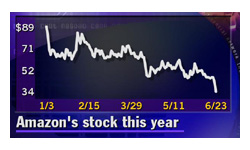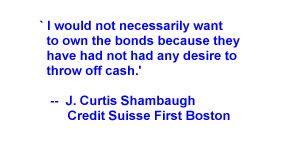|
Street eyes Amazon's credit
|
 |
June 23, 2000: 5:46 p.m. ET
Lehman Brothers report casts harsh light on retailer's leverage, cash flow
By Staff Writer Richard Richtmyer
|
NEW YORK (CNNfn) - Internet retailing giant Amazon.com came under fire Friday after analysts questioned the company's creditworthiness and its revenue growth potential.
The double-barreled blast of bad news was enough to drive shares of the company's stock down more than 19 percent, and trim more than $17 off the price of its convertible bonds in heavy trading.
In a scathing, 28-page report issued Friday, Lehman Brothers analyst Ravi Suria said that while Seattle, Wash.-based Amazon has distinguished itself as one of the best-established brands in business-to-consumer electronic commerce, "from a bond perspective, we find the credit extremely weak and deteriorating."
Citing what he called the company's high level of outstanding debt, negative cash flow and poor management of working capital, Suria said Amazon has become "extremely vulnerable" from a credit perspective.
"Going into an environment of increasing competition, expanding business segments and an expected jump in inventory, Amazon's cash flow situation is likely to worsen," he wrote in the report.
Suria said the fundamental problem he sees in Amazon's operations is that it does not generate positive net cash flow per unit of product it sells. He pointed out that for every dollar of revenue the company has generated in the past 13 quarters, totaling roughly $2.9 billion, it has raised 95 cents, or $2.8 billion, in financing.
"Such a tendency of cash operating losses would have caused any real world retailer to fold in Internet time," he said.
Amazon spokesman Bill Curry called the Lehman report "pure hogwash" and said that the company is nowhere near running out of cash.
"Anybody who knows the cash flow dynamics of our business gets that," Curry said. "We ended the first quarter with more than a $1 billion in the bank, and we expect to generate positive cash flow from operations over the rest of the year."
Since its inception, Amazon has repeatedly tapped the capital markets to fund its money-losing operation. And investors have been quick to snap up both the debt and equity securities it has offered.
And during the past 18 months, Amazon has leaned heavily on the debt markets, issuing roughly $1.9 billion in convertible bonds. Convertible bonds are exchangeable for a set number of shares of common stock at a pre-stated price.
"We do not believe that the risk in the credit is priced in the convertible bonds and recommend that investors avoid the securities," Suria said.
Standard & Poor's rates those bonds CCC-plus, considered a "low junk" grade. Moody's Investors Service rates them Caa3, three notches up from the lowest rating on its scale.
Moody's analyst Marie Menendez said the low rating is because of the uncertainty in Amazon's business strategy, and also uncertainty over its ability to produce positive operating profit and positive cash flows.
Menendez also pointed out that the high level of debt adds to Amazon's credit risk. "Because the company has chosen to obtain virtually all of its early-stage financing from the debt markets rather than the equity markets, we believe that the debt investors have actually taken on very equity-like risk," she said.
 Indeed, the convertible bonds have fallen in tandem with the stock. Amazon's (AMZN: Research, Estimates) common shares ended Friday's session 8-1/8 lower at 33-7/8. The company's convertible bonds maturing in 2009 were quoted by traders at $58 with a yield to maturity of 13 percent, down from $75.035 with an 8.97 percent yield to maturity on Thursday. Indeed, the convertible bonds have fallen in tandem with the stock. Amazon's (AMZN: Research, Estimates) common shares ended Friday's session 8-1/8 lower at 33-7/8. The company's convertible bonds maturing in 2009 were quoted by traders at $58 with a yield to maturity of 13 percent, down from $75.035 with an 8.97 percent yield to maturity on Thursday.
Despite the fact that the amount of cash Amazon burns through has increased steadily quarter-over-quarter, the company still has found believers in the bond market. But their numbers appear now to be thinning,� according to J. Curtis Shambaugh, fixed-income strategist at Credit Suisse First Boston.
"The word 'credit' comes from the Latin word 'credo,' which means 'I believe,' " he said. "If you believe in a company, then its credit is OK. If you don't believe in it, its credit is not good. They're losing some of that belief. People are starting to go through this belief change and thinking maybe they never will generate cash."
Over its four-year history, Amazon has pursued a strategy of spending heavily on sales and marketing to build market share and brand recognition, rather than attempting to earn a profit. When the company posted its fiscal fourth-quarter financial results last February, executives vowed to pay more attention to profitability in the current fiscal year.
If they fail to live up to that promise, the ranks of the Amazon faithful in the credit markets could become even thinner, Shambaugh said.
 "If they would slow down their aggressiveness, the plan suggests they might make money, but I haven't seen it yet," Shambaugh said. "I would not necessarily want to own the bonds because they have not had any desire to throw off cash. They're burning cash like mad because they have had complete and total access to the markets to get more capital. If they lose that access to the market, they run out of money." "If they would slow down their aggressiveness, the plan suggests they might make money, but I haven't seen it yet," Shambaugh said. "I would not necessarily want to own the bonds because they have not had any desire to throw off cash. They're burning cash like mad because they have had complete and total access to the markets to get more capital. If they lose that access to the market, they run out of money."
Separately, two high-profile equity analysts also chimed in on Amazon Friday, both of them taking a more cautious view of the company's fiscal second- and third-quarter revenue growth potential.
Morgan Stanley Dean Witter's Mary Meeker said there is potential for "no upside" and "modest downside" to her second- and third-quarter revenue estimates, which are $600 million and $650 million, respectively. She also said she sees no catalysts for the stock "until they make or break the December quarter."
Merrill Lynch's Henry Blodgett made similar comments earlier in the week, pegging a more conservative second-quarter revenue estimate of roughly $585 million.
Several other big-name dot.coms followed Amazon lower in the stock market Friday. Yahoo! (YHOO: Research, Estimates) fell 6-3/8, or 4.9 percent, to 125-5/16. Online auction site eBay (EBAY: Research, Estimates) fell 4-5/16, or 7.4 percent, to 53-7/8. The Dow Jones composite Internet index ended the session 15.11 lower at 276.95, a 5.2 percent decline on the day. 
-- Reuters contributed to this report
|
|
|
|
|
 |

|

